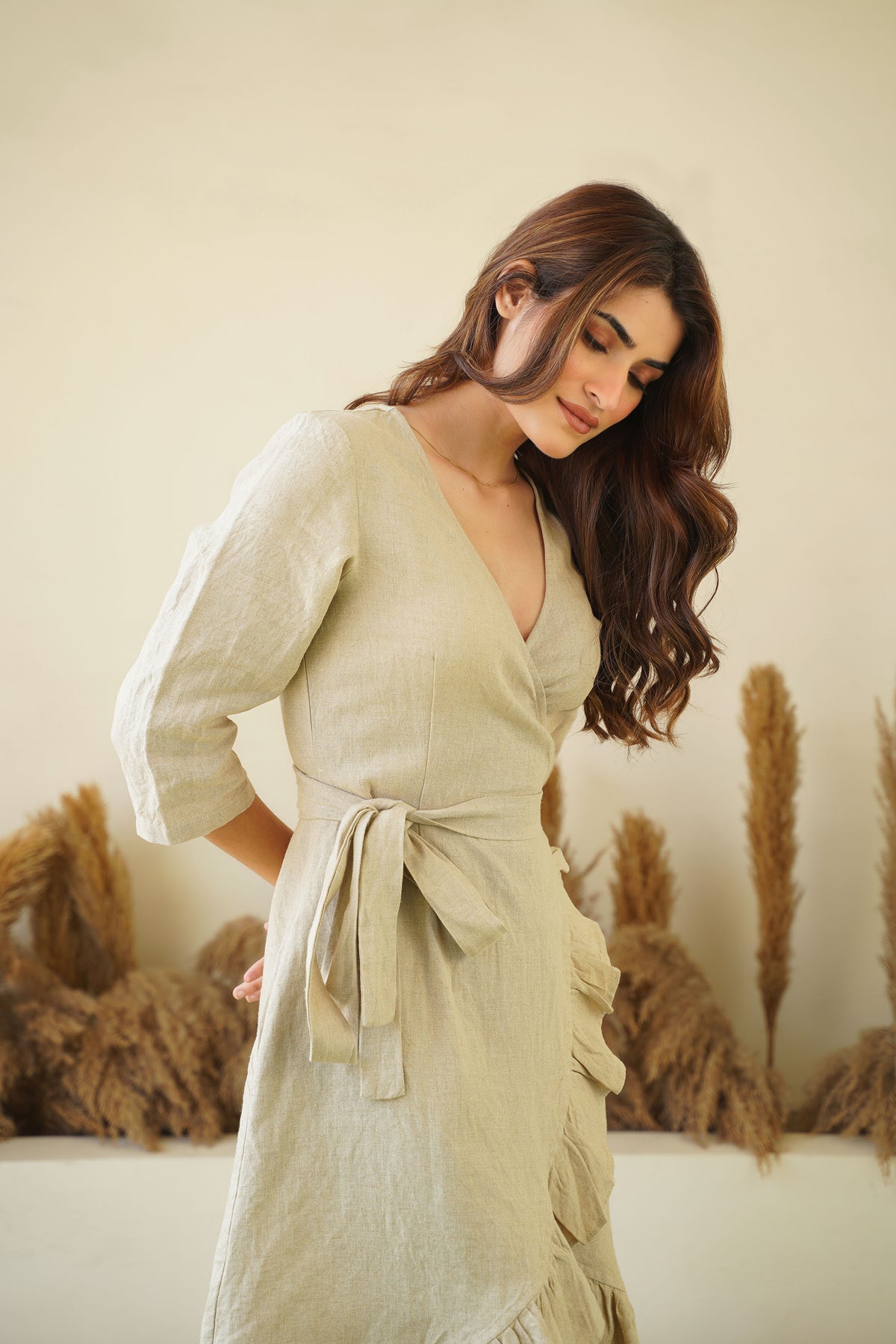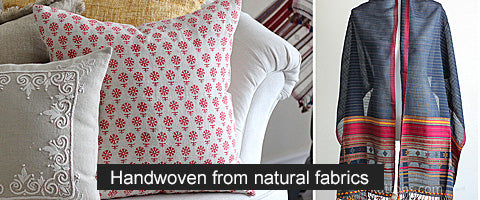Linen FAQs

1. What is linen?
Linen is a natural fiber made from the flax plant. It is strong, durable and breathable making it ideal for clothing, especially in warm climates.
2. Is linen cotton?
No, linen is not cotton. Linen comes from the fibers of the flax plant, while cotton is made from the fibers of the cotton plant. Linen fibers are typically stronger and have a crisp, slightly textured feel, making them ideal for hot, humid conditions as they help keep you cool. In contrast, cotton fibers are softer, more absorbent, and usually easier to maintain.
3. Why should I choose linen clothing?
Linen is lightweight, breathable, and moisture-wicking, making it perfect for keeping cool in warm weather. It also becomes softer with each wash, offering long-lasting comfort.
4. How do I care for linen clothing?
Linen can be machine-washed in cold water on a gentle cycle. Avoid using harsh detergents, and tumble dry on low or air dry to preserve the fabric. Linen can be ironed while damp to smooth out wrinkles.
5. Are there any special considerations for storing linen items?
Store linen in a cool, dry place away from direct sunlight to prevent discoloration. Ensure items are clean and completely dry before storing to avoid mildew. Using breathable storage bags can also help maintain linen's freshness.
6. Does linen wrinkle easily?
Yes, linen is known for its natural wrinkling, which adds to its relaxed, casual look. If you prefer a smooth finish, you can iron it, but the wrinkles are part of linen’s charm.
7. Is linen good for people with allergies and sensitive skin?
Yes, linen is hypoallergenic and gentle on the skin. It allows air to circulate and wicks moisture, making it ideal for people with sensitive or allergy-prone skin. Linen has natural antibacterial properties and also help reduce the buildup of allergens.
8. Is linen sustainable and eco-friendly?
Linen is one of the most eco-friendly fabrics. Flax, the plant linen comes from, requires less water and fewer pesticides than cotton. Linen is also biodegradable and long-lasting, making it a sustainable fashion choice.
9. How does linen compare to cotton?
Linen is more durable and breathable than cotton but tends to wrinkle more. It is better for warmer climates, as it absorbs and releases moisture faster, keeping you cooler and drier.
10. Can I wear linen year-round?
Linen is traditionally seen as a summer fabric because of its breathability, but it can be layered with other fabrics and worn year-round, especially in warmer climates.
11. Are linen dresses see-through?
Pure linen can sometimes be slightly sheer, especially in lighter colors or under bright light. However, our designs are thoughtfully crafted with proper lining, fabric weight, and cuts to ensure modesty and confidence—no surprises, just effortless elegance.
For lighter shades, you can easily layer with nude-toned undergarments or a slip dress for added comfort—though in most cases, you won’t need to.
12. How long does linen last?
Linen is a very durable fabric that can last for many years, even centuries, if cared for properly. Egyptian mummies are known to be wrapped with linen fabrics. Linen is resistant to wear and tear and becomes softer over time, maintaining its quality.
13. Does linen shrink after washing?
Linen can shrink slightly after the first wash, but pre-washed linen tends to have minimal shrinkage. Always follow the care instructions on the label to avoid excessive shrinkage. Our linen fabric is washed twice - before it is cut for making the garment, and after the garment has been made to pre-shrink and minimize the shrinkage so that you get the best fit when you receive your item.
14. Do you pre-shrink linen?
Yes, we make our fabric from pre-shrunk linen fabric. In fact, we wash our fabric twice - once when it is cut for making the garment, and the second time after the garment has been made. This way you get the dress which has been pre-shrunk for the best fit with no more shrinkages left.
15. What types of clothing are made from linen?
Linen is used to make a variety of clothing items, including dresses, shirts, pants, skirts, and scarves. Its breathability and softness make it a great choice for casual and formal wear.
16. Can linen be used year-round, or is it only suitable for warmer months?
Linen's natural breathability and moisture-wicking properties make it comfortable in both warm and cool climates, making it suitable for year-round use.
17. Is linen fabric transparent?
Some linen fabrics, especially light-colored or lightweight options, can be slightly transparent. High-quality linen fabrics like 100, 125, and 150 lea are crafted from finer fibers, making them particularly lightweight and more transparent. In pieces using these fabrics, we include a cotton lining to ensure optimal coverage and comfort.
18. How does linen fit compared to other fabrics?
Linen typically has a relaxed fit and doesn’t stretch like some other fabrics. It drapes naturally but can also hold structure well for tailored designs.
19. How can I tell if my linen is high quality?
High-quality linen will feel slightly stiff but softens after each wash. It should have an even weave, no loose threads, and feel substantial to the touch. You can also check and enquire about European Flax™ and OEKO-Tex certifications from your garment company.
20. Where does the best linen come from?
The finest linen is typically sourced from Europe, where ideal climates and long-standing traditions in flax cultivation and linen craftsmanship prevail. Belgium, along with countries like France, Lithuania, and Ireland, is renowned for producing some of the best quality linen available.
21. What is the EUROPEAN FLAX® certification? What does OEKO-TEX certified mean?
The EUROPEAN FLAX® label guarantees that the flax used in our linen is 100% grown and processed in Europe using sustainable farming practices—without irrigation, GMOs, or waste.
OEKO-TEX Standard 100 ensures that every thread, button, and dye used in our linen clothing is tested for harmful substances and found safe for human health. It’s your guarantee of skin-friendly, non-toxic fashion.
These certifications mean peace of mind. You're choosing clothing that’s safe for your skin, kind to the planet, and crafted to the highest European standards of quality and sustainability. At Kuttons, we take pride in sourcing only the finest linen, crafted by European Flax™ and OEKO-TEX Standard 100 Certified mills.
22. Why Is linen clothing more expensive?
Linen is more expensive than other fabrics because flax plants take time to grow and process. Linen's higher cost is due to the labor-intensive process of harvesting flax fibers and the meticulous weaving required. Additionally, flax is primarily grown in specific regions, contributing to its exclusivity and price. However, the fabric's longevity, sustainability, and comfort make it a worthwhile investment.
23. Does linen get softer over time?
Yes, linen becomes softer and more comfortable the more it is washed, making it one of the few fabrics that improves with age.
24. Can linen be dyed in different colors?
Yes, linen takes dye very well and is available in a wide range of colors. At Kuttons, we offer a variety of linen clothing in natural, earthy tones as well as more vibrant hues.
25. What is stonewashed linen?
Stonewashed linen is pre-washed with pumice stones to give the fabric a soft, worn-in texture. This process also reduces shrinkage and helps maintain the fabric’s durability.
26. Can I iron linen?
Yes, linen can be ironed to remove wrinkles. For best results, iron it while slightly damp or use a steam iron to make the process easier.
27. Is linen clothing good for travel?
Linen is a great travel companion due to its breathability and lightweight properties. While it may wrinkle, the wrinkles can easily be smoothed out, and the fabric keeps you cool in warmer climates.
28. What is flax plant? How does it look like?

The flax plant is an annual herbaceous plant that typically grows to about 3–4 feet tall. It features slender, bluish-green stems and narrow, lance-shaped leaves. In the flowering stage, flax produces small, delicate blue (sometimes white or pink) flowers that add to its distinctive, soft appearance. This plant is not only valued for its beauty but also for its fibers, which are used to produce linen fabric.
29. Can linen be blended with other fibers, and what are the benefits?
Yes, linen is often blended with fibers like cotton to combine the strengths of both materials. Blending can enhance softness, reduce wrinkling, and make the fabric more affordable while retaining linen's desirable properties.

